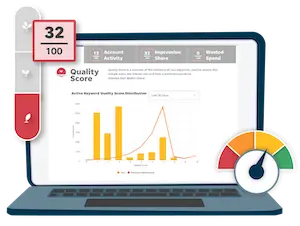Struggling to measure the performance of your content marketing campaigns? You are not the only one. Many marketers face the same issue. After all, tracking content marketing KPIs (key performance indicators) can be tricky.
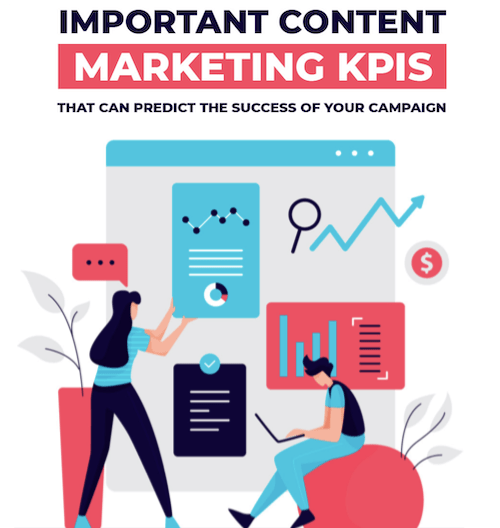
That’s because while content is a driver of business growth, content KPIs aren’t indirectly linked to your revenue. And also because content can be used to facilitate an array of marketing goals at each stage in your funnel. So depending on your campaign goal, there are different KPIs that will be most relevant for measuring success.
In this post, we’re going to take a look at KPIs that are suitable for four different content marketing goals:
- Increase brand awareness
- Increase conversions
- Generate more leads
- Boost engagement
But before we get into the details, it’s important to understand why tracking KPIs is essential for all marketers.
What’s the importance of tracking KPIs?
The biggest benefit of tracking content marketing KPIs is that it gives you an idea of whether your content gives you your desired results. It helps you know whether your target audience sees your content, engages with it, and resonates with it.
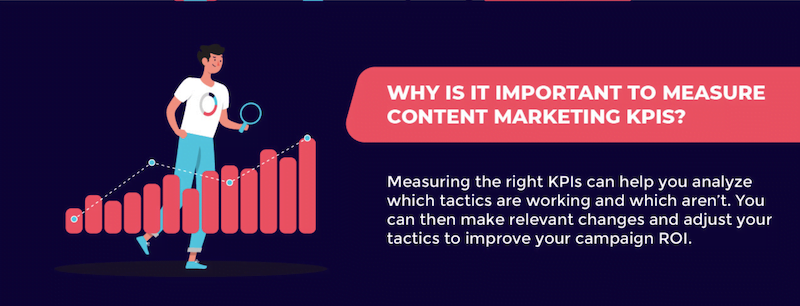
What’s more? Tracking KPIs helps you understand if you are using the right content distribution channel and if your audience finds it valuable.
Measuring the right KPIs can help you analyze which tactics are working and which aren’t. You can then make relevant changes and adjust your tactics to improve your campaign ROI.
Now that you know why you need to track KPIs, let’s look at how you can choose relevant ones.
How to choose relevant content marketing KPIs for your campaigns
According to a 2020 Content Marketing Institute B2B study, the most tracked metrics for content performance are email engagement, website traffic, and website engagement. While all these metrics are important to track, they may not necessarily be relevant to your campaign goals.
So, how do you find the right ones for your campaigns? You need to have a clear idea of what you want to achieve from your campaign. Once you set specific content marketing goals, you can match those goals with the right metrics and KPIs.
You need to have a clear idea of what you want to achieve from your campaign. Once you set specific content marketing goals, you can match those goals with the right metrics and KPIs.
Outline your goals and tie them to the KPIs related to them. To give you a better idea, we’re going to go over the KPIs for the four common campaign goals mentioned above:
Content marketing KPIs to use for increasing brand awareness
Does your target audience know you exist? We’re not talking only about the logo or the tagline. Do they know what your brand represents and what products or services you offer? That’s what brand awareness is all about. The more people that recognize and trust your brand, the more they are likely to buy your products.
So, how do you create awareness using content marketing? Write engaging content that tells your target audience what your brand is about and what you stand for. Make sure that the content that you publish is relevant to their needs, and helps them solve problems.
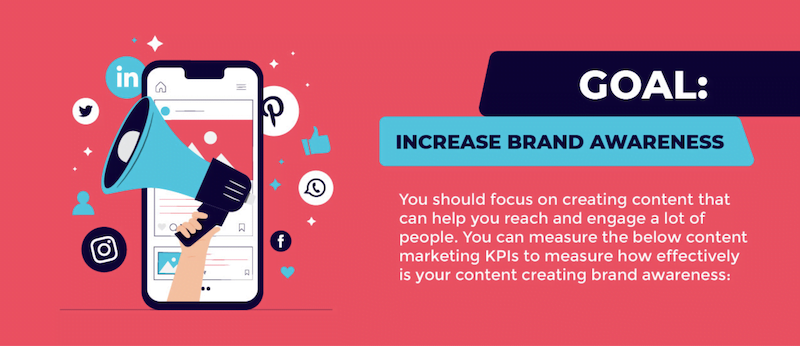
For this goal, the KPIs to track include:
- Article views: You can simply use tools like Google Analytics to check the number of views your article receives. You can also gain insights about traffic sources, average session duration, and bounce rate for each article.
- Social shares and engagement: You should track and measure social shares and engagement to see how well your content is performing. The more social shares you get, the large your audience base will be. Tools like BuzzSumo rank the top-performing content on any topic based on their social shares and engagement.
- Audience engagement: genuine audience engagement such as comments and interactions on your content can help you understand how consumers feel about your brand. Tracking audience engagement can help you analyze which types of content your target audience engages with the most.
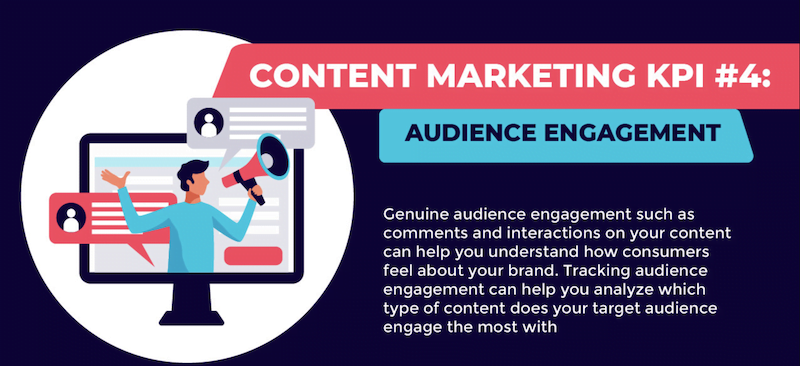
- Inbound links: Are people liking your content? Is your content being quoted on different websites? If so, this means that your content is making its mark. Getting more brand mentions and links means that the industry sees you as a credible and authoritative source.
- Follower or subscriber growth: the number of followers and subscribers you have is another important KPI to track brand awareness. And the best thing is that these numbers are easily quantifiable.
You should focus on creating content that can help you reach and engage a lot of people. You can measure the below content marketing KPIs to measure ehow effectively your content is creating brand awareness.
Content marketing KPIs to use for generating more leads
For your content marketing strategy to help you generate leads, you have to offer your audience valuable content they willingly trade their information for.
It could be exclusive insights into a topic, a webinar, an e-book, a worksheet, template, checklist, or anything that offers value. Follow the same strategy as mentioned above — identify common pain points and provide a solution.
Once you understand this, create compelling landing pages with valuable gated content. For this goal, you should track the following KPIs:
- Click-through rate: If you want to encourage users click through to your content, you should include a clear call to action (CTA) at the end of every post. Whether you want the reader to visit a specific web page, contact you, download your gated resource, or take any other action, a clear and compelling CTA can help you drive leads.
- Cost per lead: you can calculate cost per lead by dividing the cost of your campaign by the total number of leads it helped you generate. Tracking your cost per lead for multiple types of content and multiple channels can help you analyze what performs better.
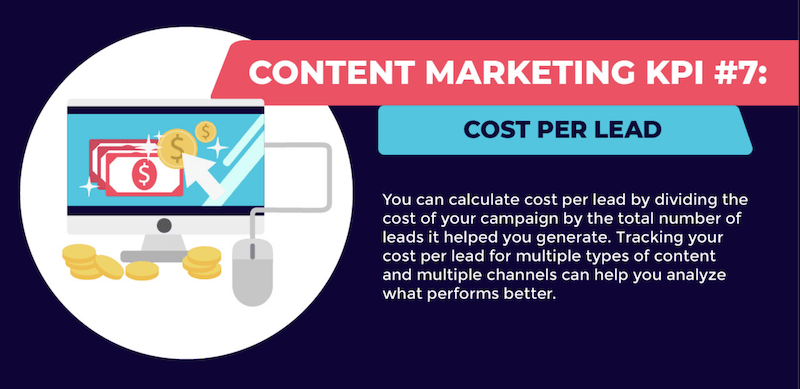
- Number of downloads
- Number of subscribers
- Form responses
Content marketing KPIs for increasing conversions
Want to boost your conversion rate? Before creating any form of content, understand your buyer’s journey. Take into account how they become aware of your brand and products and what drives them to make a purchase.
Also, look at the common problems that they may be facing. While creating content, make it a point to provide solutions to these issues. It’s also a good idea to showcase your USP. You can create product videos, demos, tutorials, case studies, customer testimonials, etc.
You want to convert your leads into customers and generate revenue for your business, right? If you want to track how many sales your campaign drives, you should track and measure the KPIs below:
For this goal, you should track the following KPIs:
- Conversion rate: tracking conversion rates can help you see which content pieces drive the maximum conversions and sales. You can track conversions using custom UTM links for each piece of content you publish and share.
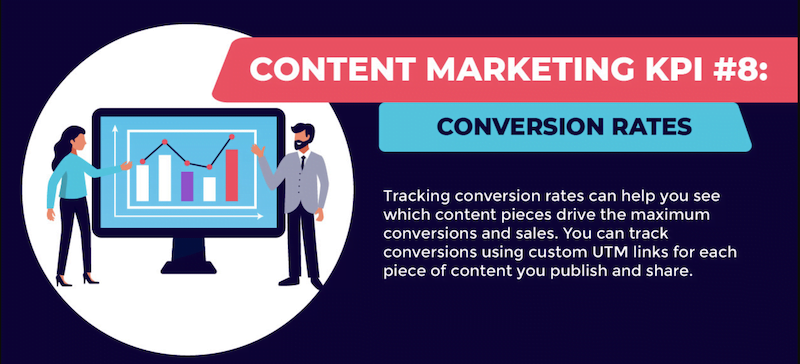
- Length of sales cycle: You should measure the length of your sales cycle to understand how long it takes for you to convert your leads. This will help you identify channels that help you generate leads that close faster and have a shorter sales cycle.
- Number of new leads generated
- Revenue generated
Content marketing KPIs for boosting engagement
Is your content interesting enough to drive participation from the audience? Audience engagement tells you how much your audience enjoys reading the content that you produce. It shows that you offer valuable content that they resonate with and that they enjoy commenting on or sharing with their friends.
High engagement on your content also leads to many benefits, including:
- Increased social media interest
- Increased brand visibility
- Improved SEO ranking
- Improved brand recognition
- Enhanced brand authority
- Increased leads and sales
Some of the content marketing KPIs to track for boosting engagement include:
- Average session duration
- Referral traffic
- Social media likes, comments, shares
- Follower growth on social media over time
- Content click-through rates
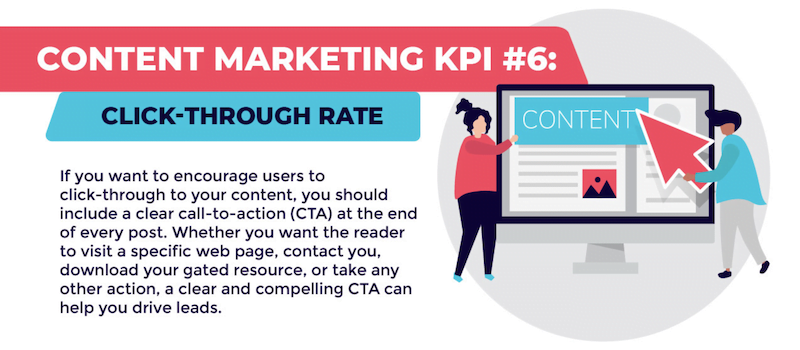
- Average time on site
As you can see, measuring the performance of your content marketing campaign requires you to be clear about your goals. It also involves understanding your audience, their pain points, and how you can solve their issues. So, whether you decide to write blog posts, create a demo, or write a product tutorial, offer value so that your content marketing efforts drive audiences to act.
Need more information on how you can track your content marketing campaigns? Check out the full infographic below.
Full infographic: 9 important content marketing KPIs that can predict the success of your campaigns

Image Courtesy: ShaneBarker.com
About the author
Shane Barker is a digital marketing consultant that specializes in sales funnels, targeted traffic and website conversions. He has consulted with Fortune 500 companies, Influencers with digital products, and a number of A-List celebrities. Connect with him on LinkedIn.

